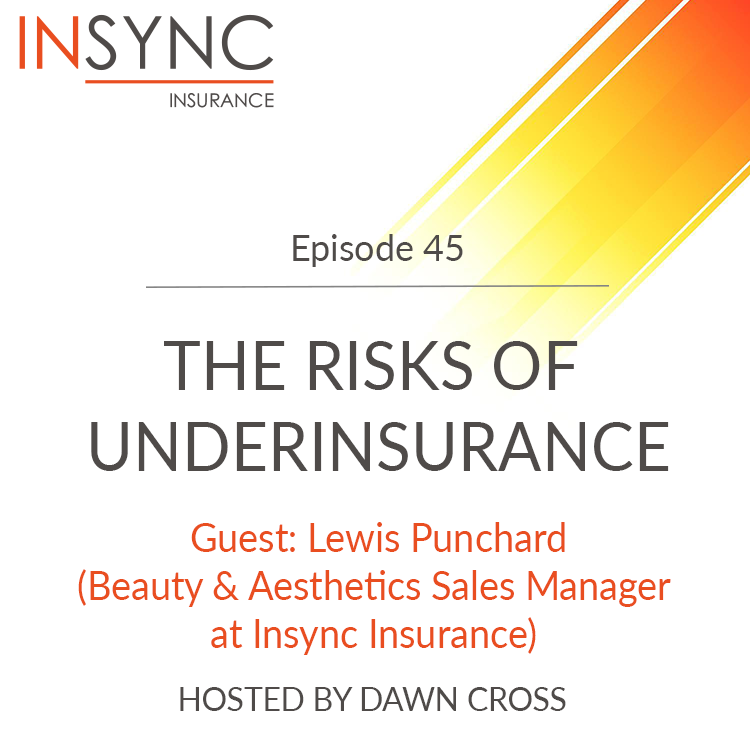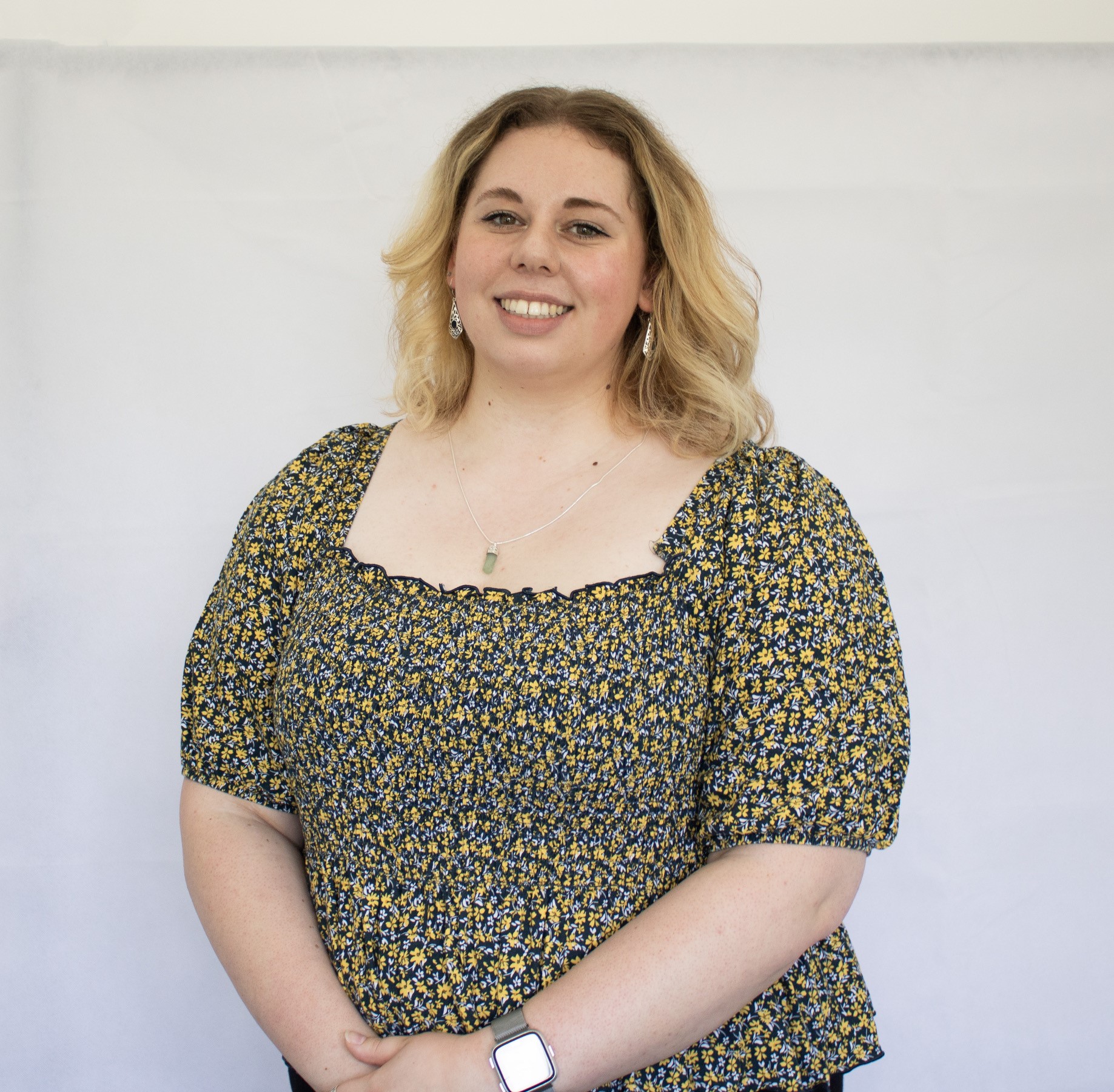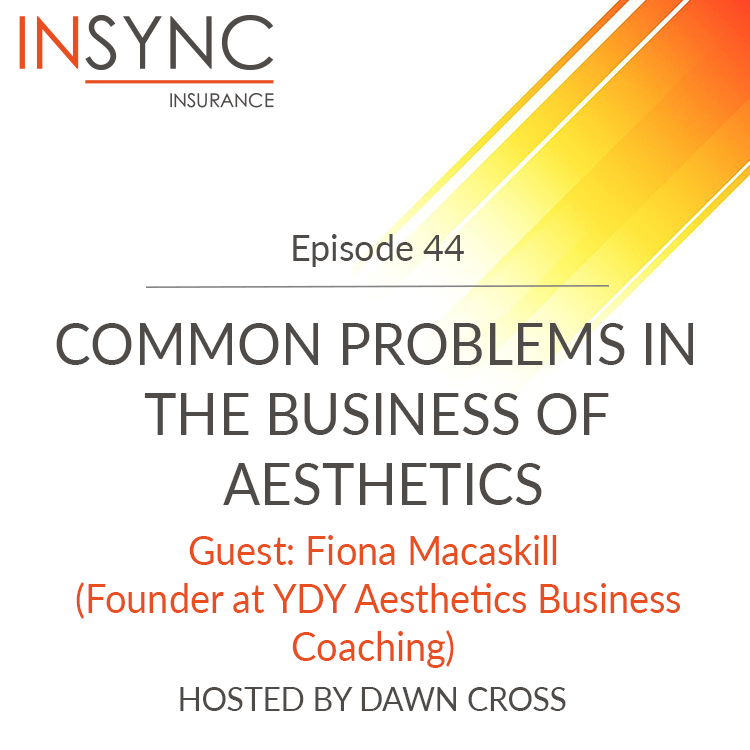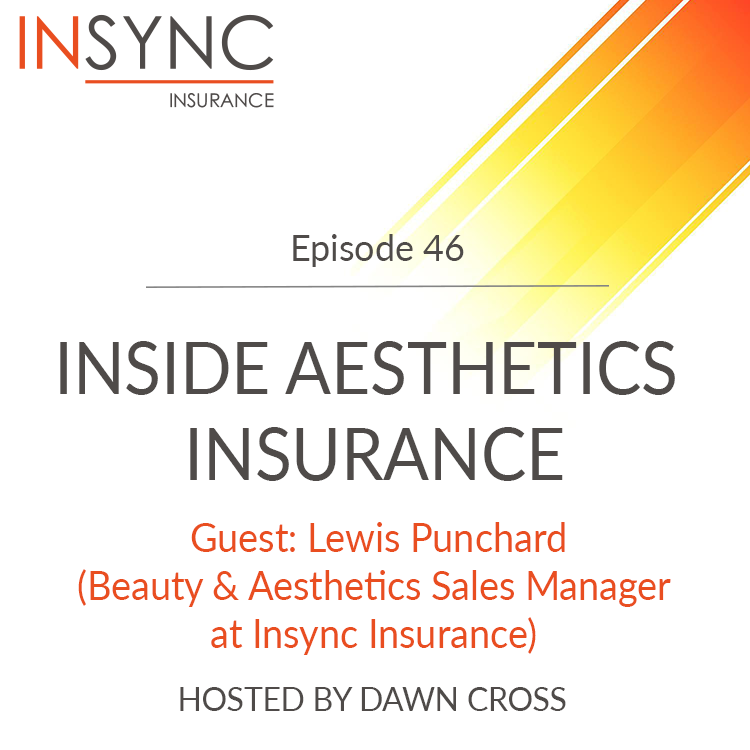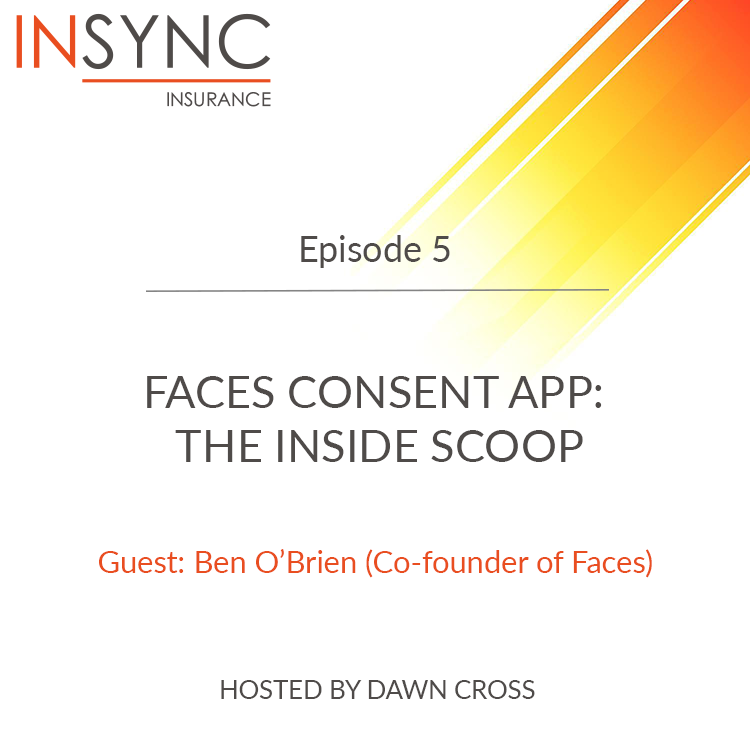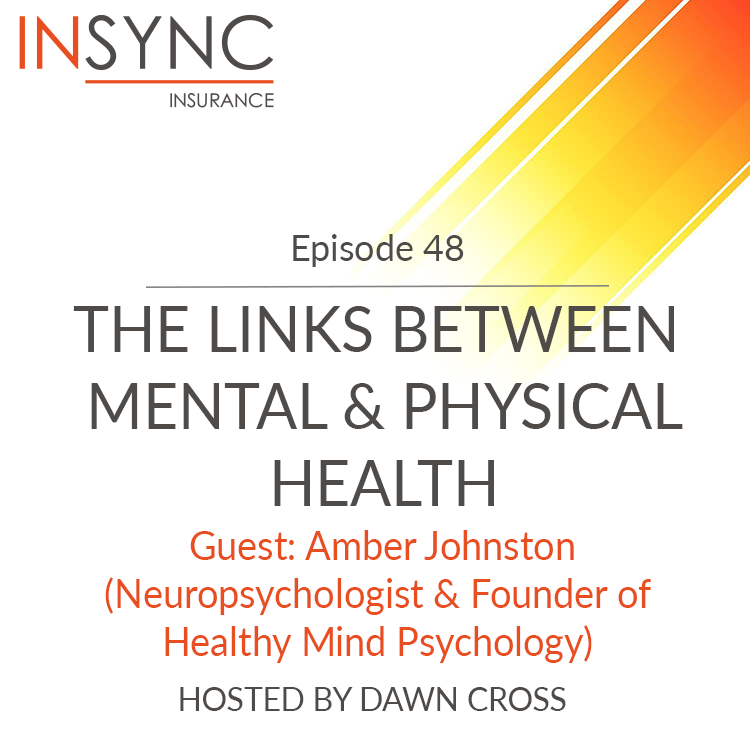Episode Transcript
[00:00:04] Speaker A: Welcome to the NSYNC Assurance podcast. I'm your host on Cross, and today I'll be delving into the problems of underinsurance for our very own beauty and aesthetics sales manager, Lewis Punchard.
If you enjoy our podcast, make sure to leave a rating on your favourite podcast directory.
[00:00:22] Speaker B: So thank you very much for coming on today. I'd like to get you to introduce yourself and what you do at NSYNC Insurance.
[00:00:29] Speaker C: Yeah, of course. So my name is Lewis Punchard and I am currently the new business sales manager for the beauty and aesthetics team.
I've been a manager here now on this department for coming up to three years this year. Prior to that, I was a sales agent on the beauty and aesthetics team. Did that for four years, so sold the product for four years and then stepped up into management.
[00:00:59] Speaker B: Amazing. So you can definitely say you've had your Fairchild experiences and range of businesses that have come to us for policies.
[00:01:07] Speaker C: Yeah, correct. So, yeah, I've now officially dealt with the full process from start to finish, insured hundreds and hundreds of beauticians and spoke to a lot more and advised and helped a lot more than, yeah, policy sold as well. So. And still continue to do so. You know, I'm still very active. I still, quote, I still sell as and when I need to.
Obviously very active on social media as part of, you know, our NSYNC social media team. I'm involved with speaking and helping clients on there as well.
So, yeah, still very involved and yeah, you could say very knowledgeable when it comes to the beauty and aesthetics insurance world.
[00:02:00] Speaker B: So obviously we've got quite an important topic today, talking about the risks of underinsurance. Now, insurance itself, obviously can feel very scary to an outside point of view. Obviously, me and you, we kind of know that integrity in like, what each term means. But sometimes people find it really difficult, which is why we're doing this episode today. So if I could start off with, I guess the main question is, you know, what is underinsurance? What does it mean?
[00:02:27] Speaker C: Yeah, fine. Yeah. Like you say, insurance is a minefield, especially for people that don't deal with it on a daily basis, you know, like I do and other people do.
But yeah, the topic obviously, for discussion today is underinsurance, which in my opinion, is one of the most important parts of insurance. Right? So the main aim of having an insurance policy is to protect yourself or your business in the event of an accident or an issue going wrong.
And I would imagine that if you are a business owner or you're a self employed worker, the last thing you want is to be paying insurance for years on end.
Finally, you need to use your policy for an issue, an accident, an injury, or whatever it might be, to then find out that actually you're inadequately insured, either through your fault or other reasons, etcetera. So, yeah, underinsurance is a massive topic. Now, underinsurance can mean a number of different things.
It's not one item, it can be a number of items when it comes to underinsurance. So, just to give you a few examples that we come across on a fairly regular basis when we're on the phone speaking to beauty and aesthetic practitioners.
So, first example, I would say, can be something as simple as under ensuring, like your equipment. So your content, your stock, your machines, whatever that may be. So, just to give you an example, you are speaking to an insurance company. You're getting a quote for your business, you've got a salon, I don't know, let's just say a basic beauty and hair salon.
Obviously, within that salon, you've got a lot of equipment, you've got a lot of stock, chairs, beds, etcetera.
When speaking to the agent or the broker or the insurer, or doing your policy or quote online or whatever, the question asks you how much cover you need for your contents and equipment.
And let's just say you estimate your contents is worth up to 50,000, for example, and that's what you select, and that's the bracket that you were given. And you've gone for up to 50,000 when actually your content's total. Worst case scenario, let's just say there's a fire, everything is gone is, say, 80,000, but you've gone for up to 50 because you didn't want to go to the next category, which might have been, say, up to 100,000. So you've opted for up to 50, knowing that actually your contents is worth more than that.
Now, that is a form of underinsurance, you know, selecting a lower limit on the basis that maybe a limit that wasn't available didn't actually suit your requirements or I. A lot of the time, the reason why people do it is cost. You know, jumping from that up to 50,000, up to, say, 100,000. That could add an extra 200 quid onto your price or an extra 500 quid onto your price, or whatever it may be. So a lot of the reason we see a lot of people doing it is primarily cost. They don't want to have to pay that extra 200 pounds. They'd rather just insure it for up to 50,000, thinking that, you know, if anything was to happen, that should hopefully be enough, when a lot of the time it's not.
So that's one scenario.
Another one that we see a lot of is limits of indemnity.
So there is no real right or wrong answer when it comes to how much indemnity insurance do you need? Is a million enough? Is 2 million enough? Is 5 million enough?
You never really can answer that question until you're in a scenario where need to use the policy and you actually see how much the claim's worth. Right now, the insurers that we use for aesthetics, you know, we don't have insurance companies that will offer less than a million pounds worth of indemnity because we don't feel that anything less than that is adequate cover.
But we do come across a lot of people that underinsure themselves by taking, you know, 100,000 or 250,000 pounds worth of COVID for public liability, professional indemnity, medical malpractice.
And when we speak to these clients and we sort of, you know, we try and dive into those conversations around, you know, the why, you know, why did you opt for that?
95% of the time it's cost. Now, what really gets me with the cost stuff is a lot of the time we're talking, you know, 30, 40 pounds a year saving, you know, so, you know, prime example, I was speaking to a customer last week, and this exact situation happened where they were insured with us for a million pounds worth of indemnity, and they left us to join another insurer for 250,000 pounds worth of indemnity for a saving of about 38 pounds a year, without realizing how much of an impact that could potentially have if a claim was to arise. And, you know, the claim bill was, you know, sub 300,000, 400,000, which is quite common in this, in this line of business. So, yeah, that's quite a long winded answer. But there's, you know, as you can probably tell from that, there's quite a few different ways that you can underinsure yourself.
Those two are probably the most common that we come across on a daily basis.
[00:08:31] Speaker B: Yeah, it definitely sounds like it. And I know seeing it in this day and age, a lot of people, you want to save money where you can, but at the end of the day, what we're trying to do is to essentially protect you in case the worst happens. And it'd be better to have that peace of mind rather than you end up getting someone claims medical, medical negligence or whatever, and then you look at it and then actually you got the short end of the stick, really, because you haven't covered yourself enough.
[00:09:00] Speaker C: Yeah, and look, I get it. You know, the current situation in the world at the moment, everyone is feeling the pinch, right? So I completely understand the logic in people's heads when it, you know, when you see a saving of 40 pounds or 50 pounds, what I suppose I want to really gain from this is just more of a, can I make people just have a little think around the decisions that they make moving forward when it comes to underinsurance? You know what I don't understand? And I suppose it's probably quite easy for me to sit here in there and say this. I'm not a business owner, so it's quite easy for me to probably sit here and say this. But from speaking to a lot of business owners, why spend, you know, 1015 years building up your business and becoming really successful and then potentially putting that all at risk by underinsuring yourself for the sake of, you know, 40 pounds a year? Because you know what, what a lot of people don't understand, you know, just to run for a basic claim scenario, let's just say you've got a salon, someone comes into your salon, they pop upstairs to the toilet, they're coming back down the stairs, they slip, they fall, they trip, whatever on the stairs. Right now, that's a complete accident. That's not the therapist's fault, it's not the salon owner's fault. That is a completely freak accident. Now, that person might severely break a bone, they might break a leg, they might break their back. You know, anything can happen from falling down the stairs. Right? Now if, let's just say, worst case scenario, that person badly breaks their leg. Yeah. And that then hinders their life. You know, they physically, they might struggle walking, they might not be able to work because their job might involve walking, etcetera. Yeah. So in terms of the claim scenario, that person will be looking to claim compensation for not being able to walk, not being able to work, you know, so when you look at numbers, let's just say, for example, that person has just a fairly basic job where they're earning 35, 40,000 pounds a year and they're 35, 40 years old. Yeah. So they've got 20 years left of their working career, 25 years left of their working career or whatever. So if that person then goes for compensation because they can't work, you could potentially be looking at 2025 years worth of that person's salary because they can't work. This is sort of stuff that they could go for in court. You've then got compensation for the injury, you've then got like your court fees, you've then got your solicitor fees. You know, you've got all these sorts of things that go into that are involved in a claim itself.
As soon as you are over that 250,000 pound indemnity limit that you potentially have taken to save yourself 30 or 40 pounds of or you're over your 100,000 pounds indemnity limit, anything over that limit, you as the business owner, you as the policyholder are then liable for those additional funds, you know, so if your claim is 350,000 and you've got a 250,000 pound indemnity limit, you are then potentially liable yourself for that 100,000 pound shortfall. Now I know certainly that I do not have 100,000 pounds lying around. I don't know about you, dawn, but I certainly don't. So, you know, unless you've are sat on a lottery win or something like that and you've got a spare 100,000 pounds lying around, a lot of the time people can't afford to pay it. Now unfortunately that doesn't stand in a court. You know, if you're being prosecuted and you're being sued and you're being told that you've got to pay this person 100,000 pounds in compensation, if you can't afford that, they come after you as an individual, you as a business. So you know, that could be your house, that could be your car, it could be any assets that you might have. If you've got a second home or you rent property, anything that you own, they can come for. And I think that's what a lot of people don't necessarily understand when it comes down to the implications of underinsuring yourself.
And we do see it quite a lot, especially more so nowadays than, you know, three, four years ago.
It's a lot more riper now, I think, following probably Covid and, you know, the financial burdens, etcetera. But we see it a lot now where people underinsure themselves for their businesses around the liability limit. Now obviously the problem that you have of it is there is no, there's no way of knowing what a claim is going to, what a claim is going to equate to. Yeah, so you don't know whether, you know, you could do a beauty treatment wrong and the claim could be 10,000 pounds. Right. If that's the case, then great, you've got 250 k's worth of COVID But then the following month or a couple of months later, you could do a Botox treatment wrong, or a dermal filler treatment wrong, or an injectable treatment, you know, that could cause blood poisoning. It could cause anything. You know, you could accidentally blind someone if you're working around the eye area, you know, anything can happen with these treatments as a complete accident. You know, no fault of your own, no fault of your skill, your training, anything can happen. Accidents do happen. And if something more serious was to arise and that that claim can soon and will go over your 250,000 pound limit, and then you're in a situation where you're looking at it and you're thinking, well, you know, six months ago, I was potentially insured for a million. I would have had more than enough cover. Six months down the line, I've saved myself 40 quid, but I've now got to fork out 100,000 pounds, or try and find 100,000 pounds because I took a saving of 40 quid six months ago. And I suppose that's really the message as to why I wanted to do this and why I wanted to have this conversation, was just to try and get the importance of making sure that people are protecting their whole business. Not just the med mouth, the public liability, the treatment cover, but, you know, your content, your stock, tenants, improvements, whatever it is that you need to protect your business, just make sure you protect everything fully.
[00:15:42] Speaker B: Yeah, it's definitely key. And as well, like we were saying, it's good for the peace of mind and that you don't end up, you know, having that claim or someone suing you, and then you go down the line, and actually, then you need to start somehow forking out, and then you do have to fork out your assets if you don't have, like, the cash to do it. And it's really important, like you said, obviously not protect yourself, but you, or maybe even your fellow employees, if you own a salon or clinic. And it's something that I think isn't sprung by enough, which is, you know, why. Why we're doing this today.
[00:16:14] Speaker C: Yeah, so I just done that as well. You know, like with other insurances, you know, if you've got yourself a half a million pound house, you've worked really hard all your life, and you've bought yourself a half a million pound house or a nice 100,000 pound car, you wouldn't ring up a car insurance company and insure your hundred thousand pound car for 10,000 pounds.
This is no different. And I think a lot of it with a lot of insurance companies and brokers nowadays, a lot of insurance companies and brokers can't advise, they can't help.
So I think speaking to brokers, speaking to insurance agents that are advised and that can help and can talk you through it and can explain the differences between a and b and under insurance and over insurance and insuring yourself correctly, etcetera. It is massive.
And just asking the experts for help.
You know, I specialize in insurance. Yeah. So I've done insurance for probably coming up to twelve years now.
And that's all I've done. That's all I've ever done is insurance sales, etcetera. If I wanted to build a garage, yeah, I wouldn't go and speak to someone that worked in Tesco or someone that worked in Audi or Lidl or someone that worked with me in sales. Yeah, you would go and speak to a builder, you know, you would get the advice from a professional, someone that's in the trade, someone that does the job and someone that's got experience in the job. And it's no different to this type of insurance. You know, speak to people that do this on a daily basis and that can actually give you advice on how to ensure and protect your business correctly. Because you don't want to be in a position after working your backside off for 15 years, growing a massive, successful business for something to go wrong accidentally, and then you've lost it all for the sake of under insuring. And you know, no one wants to pay for insurance.
[00:18:26] Speaker B: Right?
[00:18:26] Speaker C: I get it. It's a burden. All insurances are house insurance, car insurance, whatever it is insurance, you know, no one wants to pay the money for it, but it generally can save your life and your businesses and your house and your assets. It can generally save your life. So if you're going to pay 900 quid for a policy to protect your business incorrectly, why not pay 950 to insure it correctly? Right. You know, you're talking minimal differences potentially in pricing to make a massive difference when you actually need it.
[00:19:06] Speaker B: Definitely. There's another question on my mind is obviously, you know, we've talked about underinsurance. Now, some people, I guess as well, can maybe underinsure themselves without really thinking about it. Maybe, you know, they're discussing their requirements for someone over the phone or if they're going through the quote and buy portal, you know, they may forget certain assets that are used with their business, but then they forget to even insure them. Or like you were saying earlier on, with that example, you know, business contents actually, you know, should have been covered up to 80,000. So what do customers need to bear in mind when taking out an insurance policy?
[00:19:42] Speaker C: So there's a few things to bear in mind.
I'd say one of the big ones for me is understanding your policy, understand the terms, the conditions, the endorsements, you know, understand what everything means because there's a lot of, obviously, insurance jargon in documents, right? A lot of policy wordings and terms and conditions probably don't make sense to people just reading it off the back. Obviously they make sense to us and insurers and the underwriters and other brokers, et cetera. But to general people and general self employed people and business owners, etcetera, probably doesn't make a lot of sense. So for me that is obviously one of the big things is understand your policy, understand your endorsements, make sure you know exactly what you've got to do to be able to abide by your insurance. You know, endorsements is probably a big one because there's endorsements around terms and conditions for certain treatments.
You know, if you've got contents insurance on your policy, you might have an endorsement around security requirements. So, you know, making sure that all your doors meet the right security requirements for the insurer. If they require you to have an alarm, make sure it's the right alarm, etcetera. So understanding all of that is probably the biggest key point for me.
Another one is probably making sure the information that you provide to an insurer is completely accurate.
So when going for a quote application, there is certain things that you need to give valuations on. So things like contents, stock, equipment, single items, you know, if you've got a single piece of equipment worth over a single amount, you know, make sure all that information you provide is completely accurate. But also things like, you know, turnover of the business. So, you know, one thing that we find quite a lot when we ask for turn up, you know, turnover of the business or turnover for a self employed practitioner, someone that's been established for years and years, and we ask them what their turnover is for their tattoo shop that's got eight tattoo artists in it and they tell us that they're making, you know, 8000 pounds a year.
And, you know, things just don't add up, especially being someone that's, you know, got tattoos myself and I know how much they cost and how much artists charge and things like that, you know, and that sort of stuff can land you in trouble by under insuring yourself on things like your turnover and your contents. So just be completely honest.
A lot of the time, things like turnover won't affect the price of your insurance. Some insurers it does, some insurance it doesn't. But in my opinion, prices are relevant if your policy works when you need it. You know, for me, I would much rather pay 500 quid for my car insurance and know that if I crash my car or it's stolen, that it's covered, than pay 300 pound a year, have my car stolen and the insurers go, wow, actually, we can't cover that because you didn't declare that, or, you know, you did something wrong, or you didn't tell us this or you've underinsured. I would much rather pay and have piece of mind than not pay and be stunned.
Another one would be regular reviews. So make sure that every year, at least, you're doing a regular review on your insurance, making sure that all the information that the insurers got is up to date.
Because you insured your contents for 80,000 in year one, doesn't mean that the following year it's still going to be 80,000. You might have, you know, you might have acquired a new machine, you might have started doing a few more treatments, which has required you to bulk buy a bit more stock, and you might now need 90,000, you know, so make sure you keep on top of all of your limits within your policy to make sure that they are still sufficient and adequate. Same with your turnover. You know, just because you told us that the first year of your business, you were going to make 30,000, the following year, your business might be booming, it might have grown and it might now be 40,000 or 50,000. That's great. Let us know. We'll increase it for you to keep your policy up to date and in line with the insurer.
And I suppose one of the last ones I would, all I always say to customers when I speak to them, and I do quotes, when you're thinking about COVID limits and indemnity limits and contents limits, or buildings limits or whatever it may be, always think worst case scenario. Never think best case scenario. Yeah. So I don't expect, and we don't expect you to know to the pound exactly what is in your salon. Yeah, we don't expect you to know the exact limit to the pence that you need. So if you think actually, by sitting there and totaling it all up, it's probably about 40,000, ensure yourself a 45. Give yourself that peace of mind. If you think it's 40,000 don't go, ah, 30 should be enough. I probably overestimated it. If you think it's 40, go 45. Yeah. Think worst case scenario all the time with your limits and always over insure yourself rather than underinsure yourself. Don't put yourself in a position to save a few quid where you cut a couple of corners just to bring your price down, because you will regret it. If a claim. If a claim arises. And we've seen it firsthand. I've seen it firsthand. You know, I've dealt with claims. I've dealt with those customers in this situation where they've underinsured themselves five years down the line, they've needed their policy, they've come to us for a claim and then we've undercovered during the claims process that they've underinsured themselves for one way or another, and a lot of the time it is to cut costs. So, yeah, that'll be my. That would be my things to bear in mind. So understand your policy, understand your terms and conditions, don't cut costs. Always think worst case scenario.
Regular reviews, make sure you constantly keep an eye on your policy limits and things, and updating the insurer and make sure all the information that you provide is accurate as best as you can give it.
[00:26:23] Speaker B: That I've been as. Very sound advice and, you know, I feel like another thing as well. If, you know, they're on the phone with somebody that, you know, if you're unsure about anything that is being said to you about, or like, you need clarification, don't forget to ask the person on the phone or email in. Because at the end of the day, we do want to help you understand it. It's not like we're just here to trick you and be like, well, if you don't understand it, then just don't worry about it. You know, if you want clear understanding, you can always ask exactly that, ask for help.
[00:26:51] Speaker C: You know, obviously, my sales agents, my team, you know, they are not going to know the value of your contents, for example. Yeah, they probably never.
Not probably, but they would have never been to your salon or your clinic or, you know, so they're not going to be able to tell you what limits to take, but what they can do is they can run through scenarios. We can give you examples of how to roughly calculate what your sums insured need to be.
So ask the question. You know, it's the same with turnover. I hear conversations daily on the shop floor around turnover because it is a very, very hard question to answer right you know, what are you projecting to earn in the next twelve months from doing your treatments? Like no one's got a crystal ball. So, yeah, no one can see into the future, unfortunately. But there's also other ways of breaking that question down to get the outcome that we need to submit to the insurer. Yeah. So one of the ways that we would say it is, well, how many clients do you look to do a week?
Roughly about ten. Okay. And on average, how much do you charge per treatment on average? Oh, 100 pounds. Okay. So that 100 pounds times by ten is a thousand pounds, 1000 pounds a week. Yeah. Now obviously we don't expect you to work every week of the year, so we might do 1000 pounds times by 48 weeks or 50 weeks. And that's then your estimated turnover for the first year. Obviously. Then when you get to the renewal you'd have done a year's worth of trading. So we can look at your last year's figures. Yeah. And we can estimate that. So there's ways that we can help you through the process. We can't tell you your turnover. Is this because we, you know, even though we are allowed to advise, we can't tell you the answers to the questions, but we can help you work things out and we can definitely advise you on how to work out yourself. So, yeah, I 100%. If you're unsure, ask, ask us, ask the team, because they're the ones that deal with this day in, day out. They're the ones that have extensive training and know how to get you through the, quote, journeys and get you the right policies and things like that.
[00:29:06] Speaker B: That's great. Well, thank you so much for coming on today and clearing things up all about underinsurance for us.
[00:29:12] Speaker C: No, my pleasure. You know, I'm happy to have these, these conversations and in a way try and educate people in the sticky world and the tricky world of insurance because it is a minefield and for a lot of people they do struggle when it comes to getting their insurance. If there is any topics in specific that anyone wants to go over, then just let us know. And I'm more than happy to hold conversations and help and advise on the, on things.
[00:29:42] Speaker A: Thank you to my guest today, Lewis, for chatting about the problems of underinsurance and how it can affect you if a client decides to pursue legal action. If you have a question about your insurance, please email us at helloinsyncinsurance dot co dot UK or check out our policies at nsyncinsurance dot co dot UK.
I have been your host, Dawn Pross and tune in next week for another episode.
Insync is one of the UK's fastest growing insurance providers, offering comprehensive cover for SME's and self employed across the UK. Our expert team contain your insurance to meet your individual business needs and compare prices from our loads of London approved partners. We offer a five star service and have been FIFO Platinum trusted winners five years in a row.
